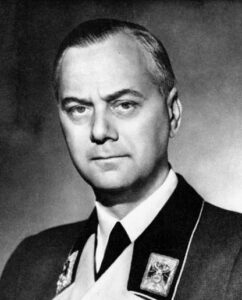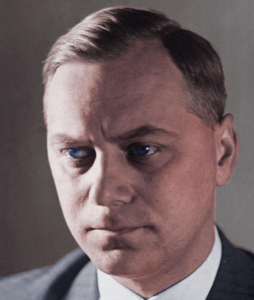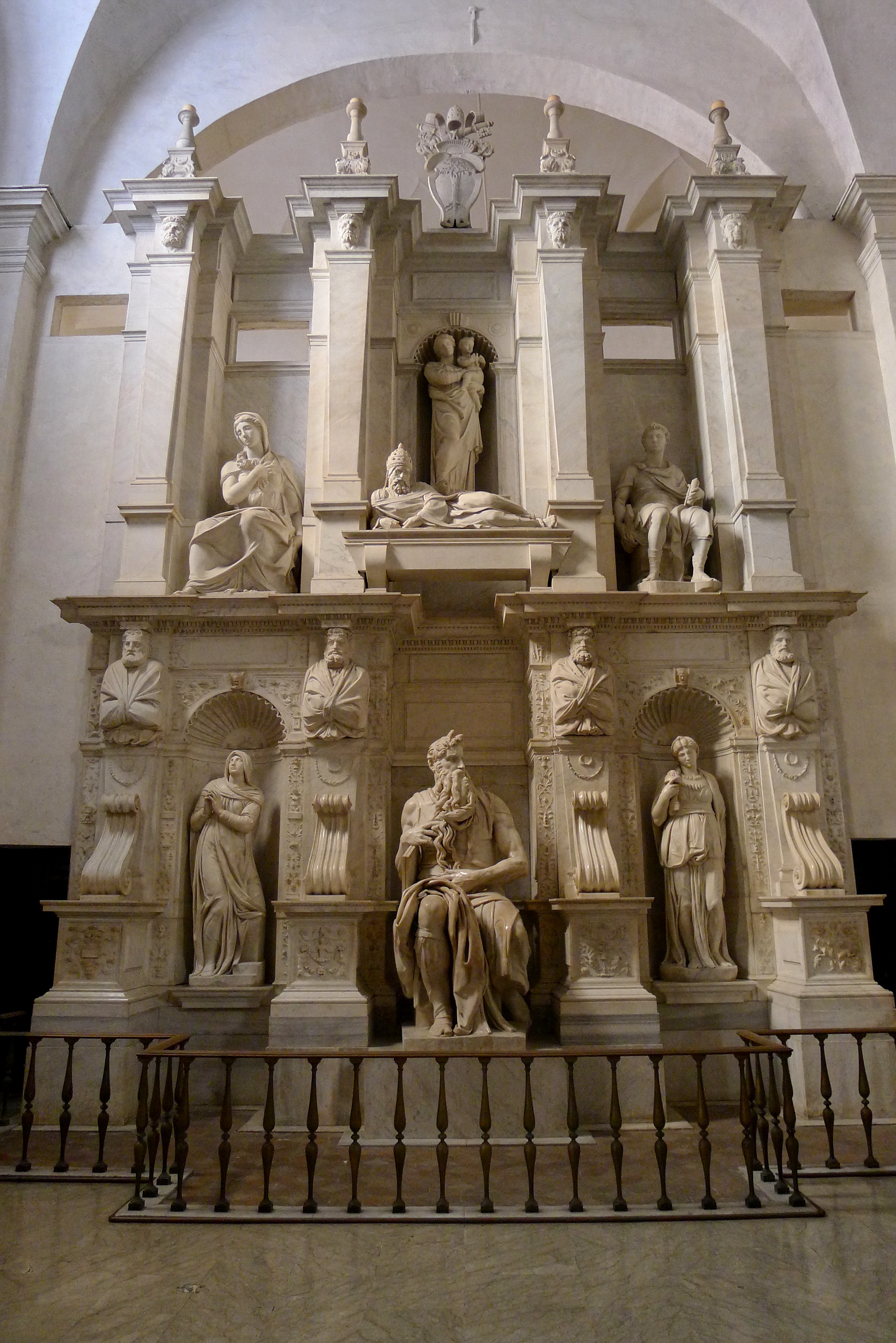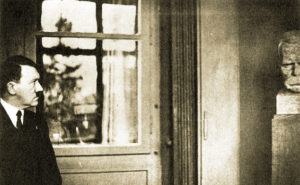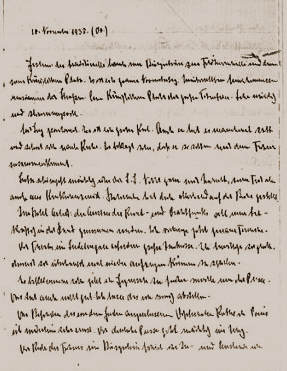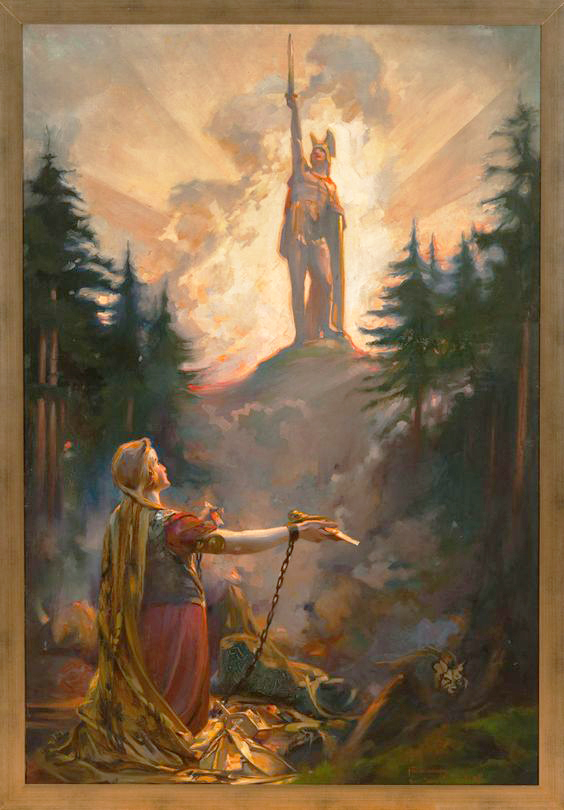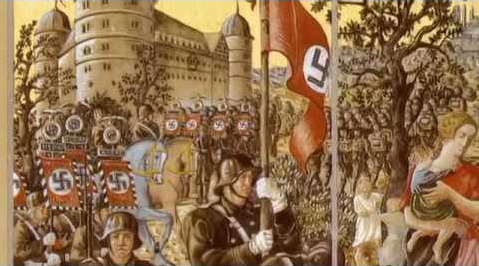by Savitri Devi
 An entirely new culture can hardly be conceived among people who retain the same religion as before. The Programme proclaimed at Hofbräuhaus states, it is true, that ‘the Party as such stands for a positive Christianity’. But, as I have said before—and as all the most intelligent National Socialists I met have admitted to me—it was well-nigh impossible, in 1920, to say anything else, if one hoped at all to gather a following. And it also remains true that the very fact of replacing, as we did, the link of common faith by the link of common blood—the creedal conception of community by the racial one—is contrary to the spirit of Christianity, no less than to its practice, always and everywhere, up to this day. It remains true, in other words, that if whatever religion that is ‘a danger to the national State’ is to be banned, then, Christianity must go—for nothing is more incompatible with the fundamental principles upon which rests the whole structure of any National State.
An entirely new culture can hardly be conceived among people who retain the same religion as before. The Programme proclaimed at Hofbräuhaus states, it is true, that ‘the Party as such stands for a positive Christianity’. But, as I have said before—and as all the most intelligent National Socialists I met have admitted to me—it was well-nigh impossible, in 1920, to say anything else, if one hoped at all to gather a following. And it also remains true that the very fact of replacing, as we did, the link of common faith by the link of common blood—the creedal conception of community by the racial one—is contrary to the spirit of Christianity, no less than to its practice, always and everywhere, up to this day. It remains true, in other words, that if whatever religion that is ‘a danger to the national State’ is to be banned, then, Christianity must go—for nothing is more incompatible with the fundamental principles upon which rests the whole structure of any National State.
However, apart from the fact that this could not be said in a political programme in 1920—or even in 1933—it could still less be done in a day. Christianity could not be too openly and too bitterly opposed, before the Nazi philosophy of life had become widely accepted as a matter of course; before it had firmly taken root in the subconscious reactions of the German people, if not also of many foreign Aryans, so as to buttress the growth of the new—or rather of the eternal—religious conception which naturally goes hand in hand with it.
Until then, it would have been premature to suppress the Christian faith radically, however obsolete it might appear to many of us. ‘A politician’, our Führer has said, ‘must estimate the value of a religion not so much in connection with the faults inherent in it, as in relation to the advantages of a substitute which may be manifestly better. But until some such substitute appears, only fools and criminals will destroy what is there, on the spot’.
One had to prepare the ground slowly, by creating anew a thoroughly Aryan soul in the young people, through their whole education; and, at the same time—for the elder folk—by giving a precise meaning (as National Socialistic as possible) to the expression ‘positive Christianity’. That is what Alfred Rosenberg has endeavoured to do in his famous book, The Myth of the Twentieth Century. His ‘positive Christianity’ is something indeed very different from the Christianity of any Church, nay, from the Christianity of the Bible, based as it is solely upon Rosenberg’s interpretation of what is obviously the least Jewish in the New Testament and upon Rosenberg’s own National Socialist philosophy.
The Christians themselves soon discovered that it was no Christianity at all. And of all the prominent men of the Party, Alfred Rosenberg is surely the one whom they dislike the most to this day—although they are probably wrong in doing so, for there were and still are National Socialist thinkers far more radical than he. And he was, moreover, far too much a theoretician to be a real danger to the power of the Churches.
But it is certain that, under all this talk about ‘positive Christianity’, there was, from the beginning, in every thoughtful National Socialist, the feeling that Germany in particular and the Aryan world at large need a new religious consciousness, entirely different from and, in many ways, in vigorous contrast to the Christian one; nay, that such a consciousness is already lurking in the general discontent, disquiet, and scepticism of the modern Aryan, and that the Nazi Movement must sooner or later help it to awake and to express itself.
Although he too speaks of ‘positive Christianity’ and insists on the fact that ‘nothing is further removed from the intentions of the NSDAP than to attack the Christian religion and its worthy servants’; and although he is very careful to separate the Movement from every endeavour to revive the old Germanic cult of Wotan, Gottfried Feder cannot help mentioning that slowly rising new consciousness, and ‘the questions, the hopes, and the wishes whether the German people will, one day, find a new form by which to express their knowledge of God and religious life’, if only to say that such questions, hopes, etc. are ‘far beyond the frame even of such a revolutionary programme as the one National Socialism proclaims’.
And it is no less certain that, although no attempt was ever made officially to overthrow the power of the Churches and to forbid the teaching of the Christian doctrine, books inspired through and through, not by the desire to revive any particular Cult of old—that of Wotan or any other God—but by the love and spirit of eternal Nordic Heathendom, some of which are exceedingly beautiful, were published under the Third Reich, and read, and sympathetically commented upon in Nazi circles; and that this was the first time that the real Heathen soul of the North—the undying Aryan soul—fully realised, after nearly fifteen hundred years, that it is alive; more so, that it is immortal, invincible.
I have already quoted Heinrich Himmler’s short but splendid book, The Voice of the Ancestors, that masterful condensation of our philosophy in thirty-seven pages, which only an out-and-out Pagan could write. It contains, among other things, a bitter criticism of the Christian attitude to life—meekness, self-abnegation, delectation in the feeling of guilt and misery; ‘aspiration towards the dust’—and, in opposition to it, a profession of faith of the proud and of the strong and free: ‘We do not exhibit our faults to anyone, we Heathens—least of all to God. We keep quiet about them; and try to make good for our mistakes’.
Of the many other books of similar inspiration, I shall recall only two far less well-known than Alfred Rosenberg’s famous Mythus but, I must say, far more radical, and deserving undoubtedly more, both the pious hatred that so many Christians of all persuasions waste upon that work and the wholehearted admiration and gratitude of all real modern Heathens: one is Ernst Bergmann’s Twenty-Five Theses of the German Religion, and the other, Johann von Leers’ History on a Racial Basis. There, the incompatibility of the National Socialist view of life and the Christian is shown as clearly, once for all, as any uncompromising devotee of either of the two philosophies could desire:
A people that has returned to its blood and soil, and that has realised the danger of international Jewry, can no longer tolerate a religion which makes the Scriptures of the Jews the basis of its Gospel. Germany cannot be rebuilt on this lie. We must base ourselves on the Holy Scriptures which are clearly written in German hearts. Our cry is: ‘Away with Rome and Jerusalem! Back to our native German faith in present-day form! What is sacred in our home, what is eternal in our people, what is divine, is what we want to build’.
And Thesis Two of the Twenty-Five Theses—the number seems to have been chosen to match the Twenty-Five Points of the National Socialist Party Programme, so as to show that the ‘new’ (or rather eternal) ‘German religion’ is ultimately inseparable from the creation in Germany of a true National State—the second ‘thesis’, I say, states that the German religion is ‘the form of faith appropriate to our age which we Germans would have today, if it had been granted to us to have our native German faith developed, undisturbed, to the present time’. As for Christianity, it is frankly called ‘an unhealthy and unnatural religion, which arose two thousand years ago among sick, exhausted, and despairing men, who had lost their belief in life’, in a word, exactly the contrary of what the German people (or, by the way, any Aryan people) need today.
I do not remember any writer having more strongly and decisively pointed out the contrast between the everlasting Aryan spirit and that of Christianity and, especially, having more clearly stressed the nature of the Aryan religion of the future. There is no question of reviving the Wotan cult, or any other national form of worship from Antiquity, as it was then. The wheel of evolution never turns backwards. The religion of resurrected Germany can only be that which would have been flourishing today, as the natural product of evolution of the old Nordic worship, had not ‘that Frankish murderer Karl’, as Professor Bergmann calls Charlemagne, destroyed the free expression of German faith and forced Christianity upon the Germanic race by fire and sword, in the eighth and ninth centuries; or rather, had not Rome herself fallen prey to what her early emperors called ‘the new superstition’, introduced by the Jews. And what can be said of the new German religion is no less true of the desirable new religion of every regenerate Aryan people, organised under a real national State.
The only international religion—if such a thing is to exist at all—should be the extremely broad and simple Religion of Life, which contains and dominates all national cults and clashes with none (provided they be true cults of the people, and not priestly distortions of such); the spontaneous worship of warmth and light—of the Life energy—which is not the natural religion of man alone, but that of all living creatures, to the extent of their consciousness. In fact, all the national religions should help to bring men to that supreme worship of the Godhead in Life; for nowhere can Divinity be collectively experienced better than in the consciousness of race and soil. And no religion definitely stamped with local characteristics, geographical or racial, should ever become international.
When such a one does—as Christianity did; as Islam did—the result is the cultural enslavement of many races to the spirit of that one whence the religion sprang, or through which it first grew to prominence.
An Indian Muslim, to the extent he is thoroughly Muslim, is outside the pale of Indian civilisation. And, to the extent he accepts Christianity, a European accepts the bondage of Jewish thought. And a Northern European, to the extent he accepts Christianity, and especially Catholicism, accepts, in addition to that, the bondage of Rome. Germany, the first Aryan nation that has rebelled on a grand scale against the Jewish yoke—cultural, no less than economical—is also the first Nordic nation to have shaken off, partly at least, in the sixteenth century, the less foreign (while Aryan) but still foreign bondage of Rome. Nothing shows better the spirit of the religious revolution—of the religious liberation—slowly preparing itself under the influence of National Socialism, than the outcry of Ernst Bergmann which I have quoted above: ‘Away with Rome and Jerusalem! Back to our native German faith in its present-day form!’
* * *
The same inspiration—the same quest of the eternal Aryan faith under its present-day Germanic form—fills Johann von Leers’ History on a Racial Basis which I mentioned. There too one finds, applied to the domain of religion and culture, that passionate assertion of the rights of the Aryan North which constitutes, perhaps, the most characteristic feature of National Socialism on the political plane.
For a political awakening of the type that Adolf Hitler provoked, stirring a whole nation to its depth, cannot go without a parallel awakening in all fields of life, especially in that of culture and religion—of thought, generally speaking. There too, one finds—based this time upon the extensive researches of Hermann Wirth in ancient lore—a protest against the idea, current in all the Judeo-Christian world, that the old Aryan North was something ‘primitive’ and ‘barbarous’; and a vision of the future in which Germany in particular and the Aryan race at large will rise again to unprecedented greatness, having re-discovered their glorious, eternal collective Self.
The passage of Johann von Leers’ book which comes a few pages after his tribute to Hitler as ‘the greatest regenerator of the people for thousands of years’ is worth quoting in extenso:
After a period of decadence and race-obliteration we are now coming to a period of purification and development which will decide a new epoch in the history of the world. If we look back on the thousands of years behind us, we find that we have arrived again near the great and eternal order experienced by our forefathers. World history does not go forward in a straight line, but moves in curves. From the summit of the original Nordic culture in the Stone Age, we have passed through the deep valleys of centuries of decadence, only to rise once more to a new height. This height will not be lesser than the one once abandoned, but greater, and that, not only in the external goods of life…. We did not pass through the great spiritual death of the capitalistic period in order to be extinguished. We suffered it in order to rise again under the Sign that never yet failed us, the Cross of the great Stone Age, the ancient and most sacred Swastika.
The form and particulars of a modern Aryan religion destined to rule consciences in the place of obsolete Christianity are not yet laid out—and how could they be? But the necessity of such a religion could not be more strongly felt and expressed; and its spirit and main features are already defined. It is the healthy religion of joy and power—and beauty—which I have tried to suggest in the beginning of this book. In other words, it is the eternal aspect of National Socialism itself or (which means the same) National Socialism extended to the highest sphere of life.
I have previously recalled the Führer’s words of wisdom concerning the growth of a new religion, better adapted than Christianity to the requirements of the people, namely, that ‘until such a new faith does appear, only fools and criminals will hurry to destroy what is there, on the spot’.
In 1924—when he wrote Mein Kampf—he obviously felt that the time was not yet ripe for such a revolution.
From what one reads in the famous Goebbels Diaries, published by our enemies in 1948 (and therefore, no one knows to what extent genuine) he would appear to have been in perfect agreement with the Reich Propaganda Minister’s radical opposition to the Churches at the same time as with his cautious handling of the religious question during the war. As long as the war was on, it was, no doubt, not the time to promote such changes as would, perhaps, make many people realise too abruptly that they were fighting for the establishment of something which, maybe, they did not want.
But, when victory would be won, then, many things that looked impossible would be made possible. According to the Diaries, the Führer was even planning, ‘after the war’, to encourage his people, gradually, to alter their diet, with a view to doing away with the standing horror of the slaughter-houses—one of the most laudable projects ever seriously considered in the history of the West, which, if realised, would have at once put Germany far ahead of all other nations, raising her conception of morality much above the standard reached by Christian civilisation. He was certainly also planning the gradual formation of a religious outlook worthy of the New Order that he was bringing into being.
Already, the most devotedly radical among the active Party members, the corps d’Élite; the SS men—were expected to find in the National Socialist Weltanschauung alone all the elements of their inner life, without having anything to do with the Christian Churches and their philosophy. And if one recalls, not the Führer’s public statements, but some of the most striking private statements attributed to him, one feels convinced that he was aware of the inadequacy of Christianity as the religion of a healthy, self-confident, proud, and masterful people no less than any of the boldest of the National Socialist thinkers, nay, no less than Heinrich Himmler himself and those whom he had in mind when he repeatedly wrote, in his brilliant booklet, ‘Wir Heiden’—’We Heathens’.
I know that the sayings attributed to a man, either by an admiring devotee in a spirit of praise or by an enemy, in a spirit of hatred, are, more often than not, of doubtful authenticity. Yet, when, while quoted in order to praise the one alleged to have uttered them, they in reality condemn him, or when, while quoted as ‘awful’ utterances, with the intention of harming him, they in reality constitute praise; and when, moreover, they happen to be too beautiful, or too true, or too intelligent for the reporter to have invented them wholesale, then one can, I believe, accept them as authentic or most probably so.
Of the many books written purposely to throw discredit upon our Führer, I have only read one through and through; but that one—the work of the traitor Rauschning, translated into English under the title Hitler Speaks—I read not merely with interest, but with elation, for it is (much against the intention of its author) one of the finest tributes paid to the Saviour of the Aryan race. Had I come from some out-of-the-way jungle and had I never even heard of the Führer before, that book alone would have made me his follower—his disciple—without the slightest reservation.
Should I characterise the author of such excellent propaganda as a scoundrel? Or is he not just a perfect fool: a fellow who joined the National Socialist Movement when he had no business to do so, and who recoiled in fright as soon as he began to realise how fundamentally opposed his aspirations were to ours? His aspirations were, apparently, those of a mediocre ‘bourgeois’. After he turned against us, he did not actually lie; he did not need to. He picked out, in the Führer’s statements, those that shocked him the most—and that were likely to shock also people who resemble him.
And he wrote Hitler Speaks, for the consumption of all the mediocre ‘bourgeois’ of the world. As there are millions of them, and as the world they represent was soon to wage war on the Führer, the book was a commercial success at the same time as an ‘ideological’ one—the sort of success the author had wanted: it stirred the indignation of all manner of ‘decent’ Untermenschen against National Socialism. But one day (if it survives) a regenerate Aryandom will look upon it as the unwilling tribute of an enemy to the greatest European of all ages.
And Hitler’s words about Christianity, reported by Rauschning in the fourth chapter of his book, would be admired—not criticised—in an Aryan world endowed with a consistently National Socialist consciousness, for they are in keeping with our spirit—and ring too true not to be authentic. ‘Leave the hair-splitting to others’, said the Führer to Hermann Rauschning before the latter turned renegade:
Whether it is the Old Testament or the New, or simply the sayings of Jesus according to Houston Stewart Chamberlain, it is all the same Jewish swindle. It will not make us free. A German Church, a German Christianity, is a distortion. One is either a German or a Christian. You cannot be both. You can throw the epileptic Paul out of Christianity—others have done so before us. You can make Christ into a noble human being, and deny his divinity and his rôle as a saviour. People have been doing it for centuries. I believe there are such Christians today in England and America—Unitarians, they call themselves, or something like that. It is no use. You cannot get rid of the mentality behind it. We do not want people to keep one eye on life in the hereafter. We need free men, who feel and know that God is in themselves.
Indeed, however clever he might have been, Rauschning was not the man to concoct this discourse out of pure imagination. As many other statements attributed to the Führer in his book, this one bears too strongly the stamp of sincerity, of faith—of truth—to be just an invention. Moreover, it fits in perfectly with many of the Führer’s known utterances, with his writings, with the spirit of his whole doctrine which is, as I said before, far more than a mere socio-political ideology. For, whatever might be said, or written, for the sake of temporary expediency, the truth remains that National Socialism and Christianity, if both carried to their logical conclusions—that is to say, experienced in full earnest; lived—cannot possibly go together.
The Führer certainly thought it premature to take up, publicly, towards the Christian doctrine as well as the Churches, the attitude that the natural intolerance of our Weltanschauung would have demanded; but he knew that we can only win, in the long run, if, wherever essentials are concerned, we maintain that intolerance of any movement sincerely ‘convinced that it alone is right’. And he knew that, sooner or later, our conflict with the existing order is bound to break out on the religious and philosophical plane as well as on the others. This is unavoidable. And it has only been postponed by the material defeat of Germany—perhaps (who knows?) in accordance with the mysterious will of the Gods, so as to enable the time to ripen and the Aryan people at large, and especially the Germans, to realise, at last, how little Christianity can fulfil their deeper aspirations, and how foolish they would be to allow it to stand between them and the undying Aryan faith implied in National Socialism.
That Aryan faith—that worship of health, of strength, of sunshine, and of manly virtues; that cult of race and soil—is the Nordic expression of the universal Religion of Life. It is—I hope—the future religion of Europe and of a part at least of Asia (and, naturally, of all other lands where the Aryan dominates). One day, those millions will remember the Man who, first—in the 1920s—gave Germany the divine impetus destined to bring about that unparalleled resurrection; the Man whom now the ungrateful world hates and slanders: our Hitler.
Imprisoned here for the love of him, my greatest joy lies in the glorious hope that those reborn Aryans—those perfect men and women of the future Golden Age—will, one day, render him divine honours.
___________
This extract from Savitri Devi, Gold in the Furnace, ed. R.G. Fowler (Uckfield, England: Historical Review Press, 2005), ch. 11, ‘The Constructive Side’, pages 211-22 originally appeared in Racial Nationalist Library.
